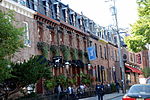The University of Pennsylvania Carey Law School (also known as Penn Law or Penn Carey Law) is the law school of the University of Pennsylvania, an Ivy League university in Philadelphia, Pennsylvania. It is among the most selective and oldest law schools in the United States, and it is currently ranked sixth overall by U.S. News & World Report. It offers the degrees of Juris Doctor (J.D.), Master of Laws (LL.M.), Master of Comparative Laws (LL.C.M.), Master in Law (M.L.), and Doctor of the Science of Law (S.J.D.).
The entering class typically consists of approximately 250 students, and admission is highly competitive. Penn Law's 2020 weighted first-time bar passage rate was 98.5 percent. The school has consistently ranked among top 14 ("T14") law schools identified by U.S. News & World Report, since it began publishing its rankings. For the class of 2024, 49 percent of students were women, 40 percent identified as persons of color, and 12 percent of students enrolled with an advanced degree.The school offers an extensive curriculum and hosts various student groups, research centers, and activities. Students publish the University of Pennsylvania Law Review, the oldest law journal in the United States. Students also publish The Regulatory Review, a regulatory news, analysis, and commentary that publishes daily. Penn Law students have the option to earn certificates of specialization in fields such as East Asian Studies or Gender and Sexuality Studies. Prior to graduation, each student must complete at least 70 hours of pro bono service.
Among the school's alumni are a US Supreme Court Justice, at least 76 judges of United States court system, nine state Supreme Court Justices, and three supreme court justices of foreign countries, at least 46 members of United States Congress as well as nine olympians, five of whom won thirteen medals, several founders of law firms, university presidents and deans, business entrepreneurs, leaders in the public sector, and government officials.
Based on student survey responses, ABA and NALP data; 99.6 percent of the Class of 2020 obtained full-time employment after graduation. The median salary for the Class of 2019 was $190,000, as 75.2 percent of students joined law firms and 11.6 percent obtained judicial clerkships. The law school was ranked #2 of all law schools nationwide by the National Law Journal, for sending the highest percentage of 2019 graduates to join the 100 largest law firms in the U.S., constituting 58.4 percent.









